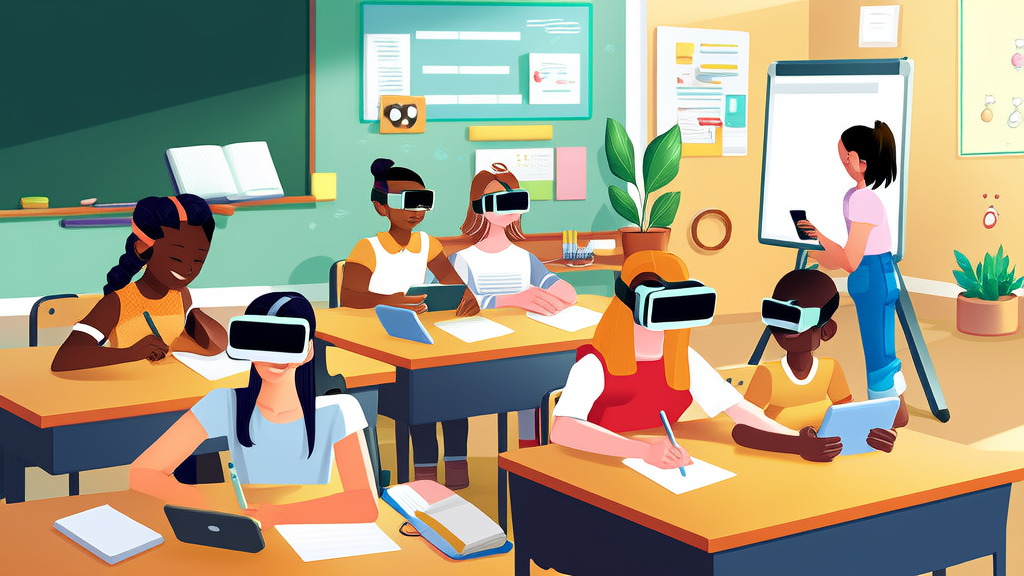Transforming K12 Education: 20% Test Score Gains and Cutting-Edge Tech in 2025

Empowering the Future: Navigating K12 Education in 2025
As we step into the heart of 2025, the landscape of K12 education is more dynamic and innovative than ever. From cutting-edge teaching methodologies to the integration of advanced educational technologies, the way our children learn is evolving at a rapid pace. This transformation not only promises to enhance academic performance but also to foster holistic development, preparing students for an increasingly complex world. In this blog post, we will explore the latest trends, research, and practical strategies that are shaping the future of education, providing valuable insights for both parents and educators.
Latest Teaching Methodologies and Their Effectiveness
The traditional model of rote learning and standardized testing is gradually giving way to more engaging and effective teaching methods. One such approach is Project-Based Learning (PBL), which encourages students to explore real-world problems and challenges through hands-on projects. PBL has been shown to improve critical thinking, problem-solving skills, and collaboration among students. For example, a high school in California implemented a PBL program where students designed and built sustainable housing models, integrating concepts from math, science, and social studies. The results were impressive, with students demonstrating a deeper understanding of the material and a higher level of engagement.
Another notable methodology is Flipped Learning, where students watch video lectures or read materials at home and use class time for interactive activities and discussions. This approach allows for more personalized instruction and helps teachers address individual student needs. A case study from a middle school in Texas showed that flipping the classroom led to a 20% increase in test scores and a significant improvement in student participation.
Child Development Insights and Research
Recent research in child development has highlighted the importance of social-emotional learning (SEL) in the K12 curriculum. SEL focuses on developing self-awareness, self-management, social awareness, relationship skills, and responsible decision-making. Studies have shown that students who participate in SEL programs exhibit better behavior, improved academic performance, and stronger mental health. For instance, a longitudinal study conducted by the Collaborative for Academic, Social, and Emotional Learning (CASEL) found that students who received SEL instruction had a 13% gain in academic achievement compared to their peers.
Additionally, there is growing recognition of the role of play-based learning in early childhood education. Play is a natural and powerful way for young children to learn and develop essential skills. A recent report from the American Academy of Pediatrics emphasized that play-based learning fosters creativity, resilience, and cognitive flexibility. Educators and parents can support this by incorporating unstructured playtime into daily routines and creating environments that encourage exploration and discovery.
Educational Technology Trends
Technology continues to revolutionize the K12 education sector, offering new tools and platforms that enhance the learning experience. Artificial Intelligence (AI) is one of the most exciting developments, with AI-powered tutoring systems and adaptive learning platforms that provide personalized feedback and support. For example, Carnegie Learning's MATHia platform uses AI to tailor math instruction to each student's unique needs, resulting in significant improvements in math proficiency.
Virtual Reality (VR) and Augmented Reality (AR) are also making waves in the classroom. These immersive technologies allow students to explore historical sites, conduct virtual experiments, and engage in interactive simulations. A study from the University of Maryland found that students who used VR to learn about ancient Rome retained 20% more information than those who learned through traditional methods. As these technologies become more accessible, they offer endless possibilities for enriching the educational experience.
Practical Tips for Parents and Teachers
For parents and teachers looking to support and enhance the learning journey of their children, here are some actionable tips:
- Stay Informed: Keep up with the latest research and trends in education. Follow reputable sources like Edutopia, CASEL, and the National Education Association (NEA).
- Collaborate and Communicate: Maintain open lines of communication between home and school. Regularly discuss your child's progress, challenges, and successes with their teachers.
- Encourage Exploration: Foster a love of learning by encouraging curiosity and exploration. Provide opportunities for hands-on activities, field trips, and extracurricular activities that align with your child's interests.
- Support SEL: Prioritize social-emotional learning by modeling and practicing empathy, self-regulation, and positive relationships. Use resources like the CASEL framework to guide your efforts.
- Embrace Technology: Leverage educational technology to enhance learning. Explore apps, platforms, and tools that can support your child's academic and personal growth.
Conclusion: Shaping the Future Together
The future of K12 education is bright, with a wealth of innovative methodologies, research, and technologies at our disposal. By staying informed, collaborating, and embracing new approaches, parents and educators can create a nurturing and enriching environment for our children. Let us work together to empower the next generation and ensure they are well-prepared to face the challenges and opportunities of the future.
If you have any questions or would like to share your own experiences, please leave a comment below. We look forward to hearing from you!